INTERNACIONAL
Cómo una ciudad fronteriza china mantiene a flote a la economía rusa
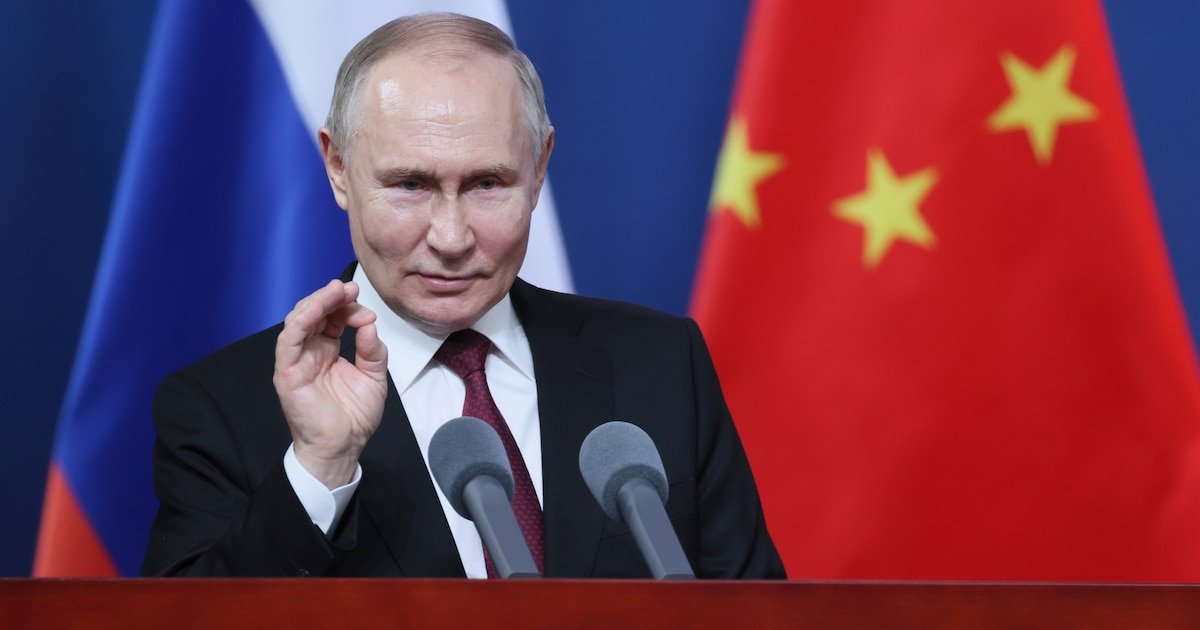
Miles de toneladas de madera siberiana cruzan la frontera hacia China por la ciudad de Manzhouli, donde son procesadas para fabricar componentes de muebles y palillos, mientras grandes cargamentos de colza rusa llegan para su conversión en aceite de canola. El dinamismo en este cruce fronterizo refleja cómo las economías de ambos países han reforzado su interdependencia desde la invasión rusa de Ucrania en febrero de 2022.
El comercio bilateral superó los 240.000 millones de dólares el año pasado, un incremento del 66% respecto al periodo previo al conflicto. China se ha consolidado como el mayor comprador de petróleo, madera y carbón rusos, y se encuentra próxima a convertirse en el principal destino del gas natural de Rusia. Además, los datos muestran que el intercambio no solo incluye materias primas: el flujo de productos manufacturados chinos hacia Rusia, como ropa, electrónica y vehículos, ha crecido un 71% desde el inicio de la guerra.
Manzhouli mantiene un rol central en este intercambio. La ciudad, que cuenta con una línea férrea construida por Rusia en 1900, ve diariamente el paso de trenes y camiones cargados de materias primas. El eslogan económico oficial describe el modelo como “suministro ruso, procesamiento chino”, remarcando la función de Rusia como proveedor de materias primas para la industria manufacturera china, que supera ampliamente en escala a la rusa.
Cerca del 6% de la economía rusa ya depende de las exportaciones a China, una proporción comparable a la de Irán, otro país afectado por sanciones internacionales. A consecuencia de las restricciones impuestas por decenas de naciones a la economía rusa, Moscú ha reorientado su comercio exterior hacia el este, dependiendo cada vez más de su relación económica con Beijing.
En la actualidad, Rusia abastece a China de recursos como maderas de pino para construcción y mobiliario, abedul blanco para palillos, álamo para molduras y olmo resistente para soportes de minas de carbón, mientras importa del gigante asiático equipamiento industrial, bienes de consumo y automóviles. Según la Organización de las Naciones Unidas para el Desarrollo Industrial, la cuota de Rusia en la manufactura global es de solo 1,33%. China, en cambio, produce el 32% de los bienes manufacturados en el mundo.

Esta asimetría ha hecho que Rusia adopte un papel de proveedor de materias primas y consumidor de productos acabados chinos, consolidando en la frontera de Manzhouli el epicentro de una relación comercial estratégica marcada por el cambio de poder económico y la influencia de las sanciones internacionales.
La postura de China frente a la guerra en Ucrania ha fortalecido su relación con Rusia y generado fricciones con la Unión Europea (UE). Según directivos de ambos países, como el ministro de Asuntos Exteriores chino, Wang Yi, tras reunirse con su homólogo ruso, Sergey V. Lavrov, “las relaciones chino-rusas representan la relación entre grandes potencias más estable, madura y significativa en materia estratégica en la actualidad”. El suministro de drones y componentes por parte de empresas chinas para su uso en el conflicto destaca como muestra concreta de este apoyo.
Para la Unión Europea, esta colaboración ha suscitado preocupación. En una cumbre celebrada en Beijing, los dirigentes comunitarios solicitaron nuevamente a Xi Jinping, principal líder chino, que redujera la cooperación económica e industrial de China con Rusia en el contexto de la guerra. Ursula von der Leyen, presidenta de la Comisión Europea, advirtió que el posicionamiento chino en el conflicto sería “un factor determinante” para las futuras relaciones bilaterales y que el respaldo continuo de China a Rusia genera “inestabilidad e inseguridad en Europa”.
El desplazamiento de importaciones de China hacia productos rusos ha tenido consecuencias para terceros países, como Canadá. Tras posicionarse junto a Estados Unidos y respaldar el aumento de aranceles a productos chinos, Canadá vio cómo China sustituyó importaciones de materias primas, especialmente la colza, optando por proveedores rusos. En represalia, el gobierno chino impuso aranceles del 100% a las importaciones canadienses de aceite y harina de canola, además de iniciar una investigación comercial sobre el envío de colza canadiense.
Estas medidas repercuten directamente en la estructura de las cadenas de suministro en Asia y contribuyen a realinear los flujos globales de materias primas, al tiempo que evidencian el uso de instrumentos comerciales para la presión política y la competencia por mercados estratégicos.

Las relaciones comerciales entre China y Rusia han mostrado señales puntuales de tensión, principalmente en el ámbito de las materias primas y el mercado automovilístico. Autoridades rusas prohibieron la exportación de pino recién cortado hacia territorio chino, imponiendo que la corteza se retire y los troncos sean aserrados en serrerías siberianas antes de su envío. Esta medida ha incomodado a empresarios chinos como Huang Baoqiang, gestor de un aserradero cercano a la frontera, que ve encarecido y complicado el acceso directo al recurso.
En respuesta a la competencia rusa en el sector energético, China introdujo aranceles a la importación de carbón ruso a principios del año pasado, tras el incremento de la producción de sus minas estatales. Estas acciones muestran que, pese al estrechamiento de la alianza, ambos gobiernos priorizan la protección de sus respectivas industrias cuando los intereses nacionales chocan.

El mercado automovilístico ruso ha experimentado una transformación significativa tras la retirada de los fabricantes occidentales después de la invasión a Ucrania. Los vehículos fabricados en China pasaron de tener una presencia marginal en 2021 a abarcar el 60% de las ventas en Rusia a finales del año pasado, según la consultora GlobalData Automotive. Ante el retroceso de las marcas occidentales, el gobierno ruso impuso desde el 1 de octubre una tasa de importación de 7.500 dólares a los automóviles nuevos, aunque dejó exentas las compras de autos usados por ciudadanos rusos.
Empresarios chinos en Manzhouli han aprovechado esta excepción. A poca distancia de la frontera, una sala de exhibición de autos usados, con una monumental puerta de bronce y un vestíbulo de 24 metros de altura, ofrece a los compradores rusos modelos casi nuevos de marcas como BMW, Land Rover, Volkswagen, y también de firmas chinas como Zeekr y Hongqi, permitiendo la exportación a Rusia sorteando el nuevo arancel. La ausencia de automóviles completamente nuevos y el aumento en la demanda de usados reflejan la rápida adaptación comercial ante las barreras regulatorias impuestas en el intercambio bilateral.
INTERNACIONAL
German chancellor defends remarks on migrants suggesting citizens ‘afraid to move around in public spaces’
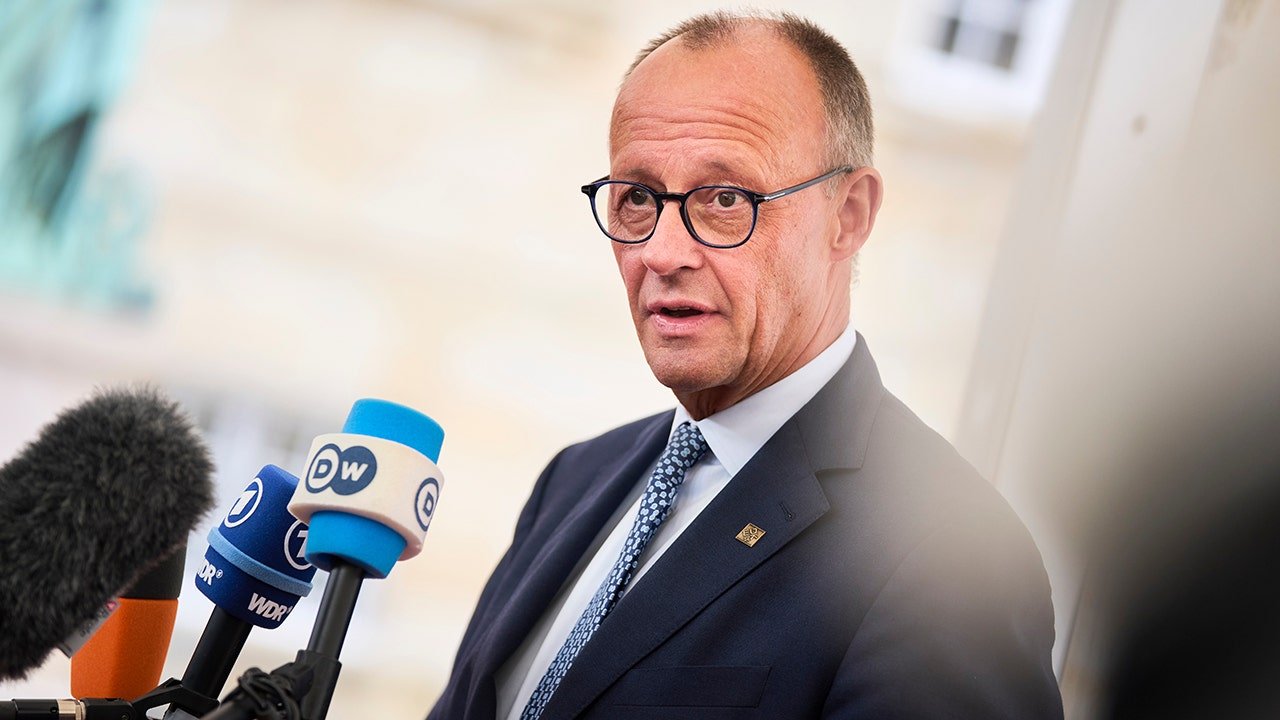
NEWYou can now listen to Fox News articles!
German Chancellor Friedrich Merz has doubled down on comments he made about migration, saying many Germans and Europeans are «afraid to move around in public spaces.»
Merz has rejected criticism from some German political circles over his government’s tough stance on illegal immigration.
«But we still have this problem in the cityscape, of course, and that’s why the federal interior minister is facilitating and carrying out large-scale deportations,» he said during a visit to Potsdam last week.
GERMANY BRACES UNDER COLLAPSING GOVERNMENT AND LOOMING TRUMP TRADE WAR
German Chancellor Friedrich Merz sparked backlash while remarking about the country’s migration policies. (Thomas Traasdahl/Ritzau Scanpix via AP)
The statement prompted backlash, some accusing the German leader of being racist. He rejected the criticism while on the sidelines of a summit on the Western Balkans in London, saying migrants were «an indispensable part of our labor market,» German-based DW News reported.
He also claimed that many people in Germany and across Europe are nonetheless «afraid to move around in public spaces» because of migrants «who do not have permanent residence status, do not work and do not abide by our rules,» the outlet reported.
MD GOV DEFENDS $190K TRUMP-CENTRIC IRISH CONSULTANT CONTRACT AS POTUS MOVES IN NEXT DOOR

Numerous demonstrators gather for a demonstration in Berlin Oct. 19, 2025, with the slogan «Brandmauer hoch!» («We are the cityscape»), referring to a statement made by Chancellor Merz in reference to migration policy. (Annette Riedl/picture alliance via Getty Images)
«I don’t know whether you have children. If you do, and there are daughters among them, ask your daughters what I might have meant. I suspect you’ll get a pretty clear and unambiguous answer. There’s nothing I need to retract,» he said when asked if he would withdraw his earlier remarks.
Some have signed a petition disputing Merz’s comments. The signees include actor Marie Nasemann and environmental activist Luisa Neubauer.
CLICK HERE TO GET THE FOX NEWS APP
«There are approximately 40 million daughters in this country. We have a genuine interest in ensuring that our safety is taken seriously,» Neubauer wrote on Instagram. «What we are not interested in is being misused as a pretext or justification for statements that were ultimately discriminatory, racist and deeply hurtful.»
germany,illegal immigrants,europe
INTERNACIONAL
Brasil advierte que una «intervención externa» en Venezuela puede «incendiar» América del Sur

Una intervención de Estados Unidos para deponer al presidente de Venezuela Nicolás Maduro «puede incendiar América del Sur» y Brasil no lo aceptará, advirtió el asesor especial del presidente Luiz Inacio Lula da Silva, Celso Amorim.
En una entrevista con AFP, Amorim, que fue canciller de Lula en sus primeros dos gobiernos (2003-2010), expresó preocupación por los ataques estadounidenses sin «ninguna prueba» contra embarcaciones de supuestos narcotraficantes en el Caribe, cerca de las costas venezolanas, lo que calificó como una «amenaza de intervención externa».
El asunto, según el veterano diplomático, puede estar en la agenda de una reunión todavía a confirmar entre Lula y el presidente estadounidense, Donald Trump, el domingo en Malasia, al margen de la cumbre regional de la Asean.
Las relaciones entre Trump y Lula se tensaron luego de que el republicano impusiera aranceles punitivos del 50% al gigante sudamericano por el juicio al ex presidente Jair Bolsonaro, condenado a 27 años de cárcel por golpismo.
-¿Lula expresará su descontento ante Trump por los ataques estadounidenses a embarcaciones en el Caribe si se concreta su reunión el domingo?
-Dependerá del ambiente de la conversación. Brasil claramente está preocupado con el uso de la fuerza, la amenaza del uso de la fuerza o la amenaza de métodos clandestinos como la CIA para derribar gobiernos de la región. No queremos una convulsión en nuestra región. Dependiendo de lo que suceda, puede efectivamente tener consecuencias muy profundas y muy graves. No va a quedar contenida a los países donde ocurra. Hay una amenaza de intervención externa, hay personas muriendo ya. No sé si son narcotraficantes, pero no hay ninguna prueba de que lo sean. Es muy peligroso».
-¿Si EEUU interviene para deponer al mandatario venezolano Nicolás Maduro, cómo se posicionaría Brasil?
-Estamos en contra de una intervención externa. El problema de quién va a gobernar en Venezuela es de los venezolanos. No es fácil, exige mucha ayuda para crear puentes, pero una intervención externa, sea armada o con servicios de inteligencia, no es el camino. No podemos aceptar una intervención externa porque eso va a crear un resentimiento inmenso. Para Brasil y para Colombia (puede) crear problemas concretos de refugiados. Eso puede incendiar América del Sur y llevar a la radicalización de la política en todo el continente».
-¿Qué permitió el acercamiento de Brasil y Estados Unidos después de meses de tensiones por el juicio a Bolsonaro y los aranceles?
-«Diría que el sentido común, de ambas partes. El presidente Lula no va a dar lecciones a Trump y espero que lo contrario no ocurra tampoco. Tiene que haber un diálogo para buscar los puntos de encuentro. Se trata de continuar una conversación positiva y sobre todo un buen entendimiento en la parte económica y comercial».
-¿Cree que Trump desistió de apoyar al bolsonarismo en Brasil tras la condena al ex presidente ultraderechista?
-La palabra Bolsonaro no fue pronunciada en la conversación (telefónica de Lula y Trump el 6 de octubre). En todo gobierno hay personas más pragmáticas y personas más ideológicas. En este caso, creo que personas pragmáticas deben de haber hablado con Trump».
-¿Qué ofrecerá Brasil a EEUU para lograr la retirada de los aranceles?
-Creo que lo más importante es haber comenzado un diálogo sin precondiciones. Se acordó crear un grupo de trabajo que discutirá las cuestiones comerciales. Ahora, cómo será, qué será importante, es muy pronto para decirlo. Yo fui negociador durante mucho tiempo y no es cuestión de ir ofreciendo cosas.
-¿Los minerales críticos, entre ellos las tierras raras que Brasil posee, pueden estar sobre la mesa?
-Conversaremos sobre cualquier asunto. Sobre minerales críticos y tierras raras, lo importante es que seamos capaces de definir nuestras necesidades. Nosotros estamos abiertos a inversiones, siempre que también haya beneficio para Brasil.
-¿Brasil prioriza lograr la exención de aranceles a sectores importantes como la carne y el café?
-La carne y el café son importantes obviamente pero las máquinas y motores también. Todos los sectores serán negociados. Creo que va a ser una discusión práctica, vamos a ver qué conseguimos. No hubo condicionamiento político, jurídico o ideológico en relación a la negociación. Eso es lo más importante, ya es un nuevo comienzo.
INTERNACIONAL
US sanctions Colombian president and family over drug trafficking allegations
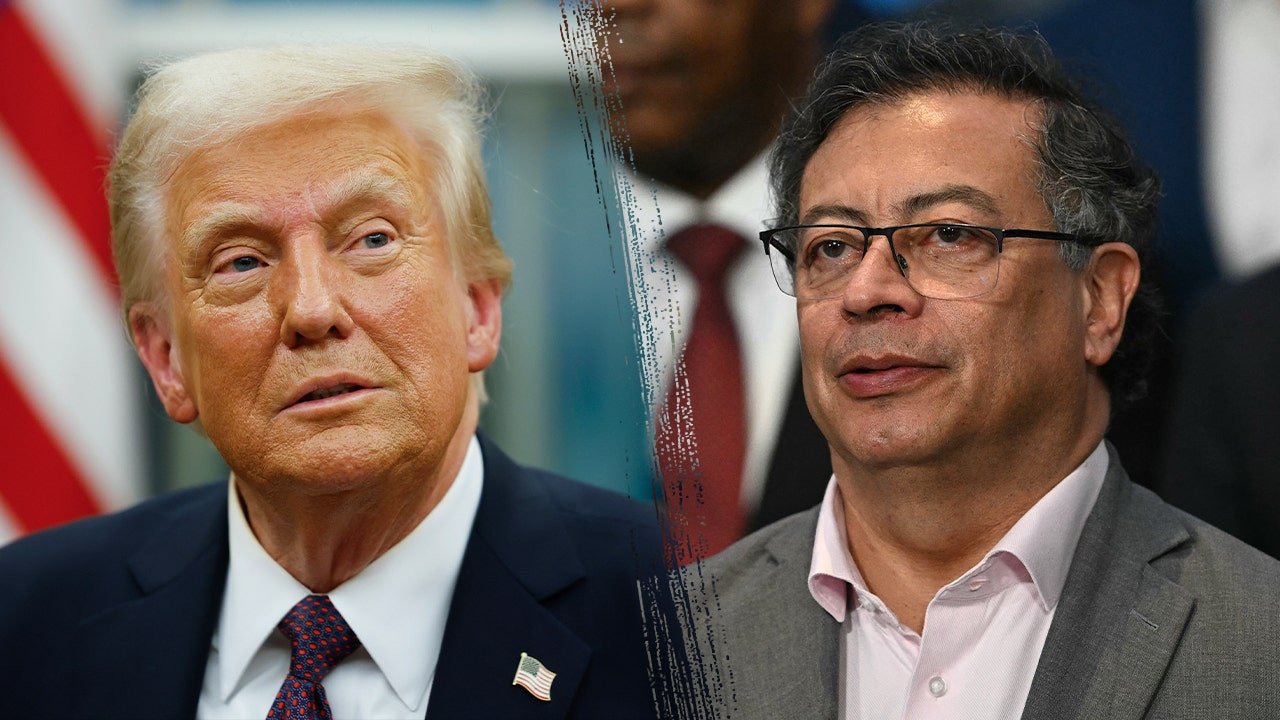
NEWYou can now listen to Fox News articles!
The Trump administration’s Treasury Department on Friday sanctioned Colombian President Gustavo Francisco Petro, along with his wife, son and a close associate, accusing the group of being involved in the global illicit drug trade.
The action was taken under a Biden administration executive order targeting foreigners involved in the drug trade.
Petro joins a number of other world leaders under sanction by the Treasury, including Russian President Vladimir Putin, Venezuelan president Nicolás Maduro and former president of Syria Bashar al-Assad.
President of Colombia Gustavo Petro Urrego was placed under sanction by the U.S. Treasury. (AP Photo/Pamela Smith)
TRUMP DOUBLES DOWN ON COLOMBIA CRACKDOWN, CALLS PETRO ‘LUNATIC,’ VOWS TO END ALL US PAYMENTS OVER DRUGS
«Since President Gustavo Petro came to power, cocaine production in Colombia has exploded to the highest rate in decades, flooding the United States and poisoning Americans,» Treasury Secretary Scott Bessent wrote in a news release. «President Petro has allowed drug cartels to flourish and refused to stop this activity.»
Petro responded to the announcement on X, calling the sanction «a complete paradox.»
«Indeed, Bernie Moreno’s threat has come true; my children, my wife, and I have been added to the OFAC list,» Petro wrote in a post. «My lawyer in my defense will be Dany Kovalik from the USA. Fighting drug trafficking for decades and effectively has brought me this measure from the government of the society we helped so much to curb their cocaine consumption. A complete paradox, but not a step back and never on our knees.»
The Treasury accused Petro, his wife Veronica, eldest son Nicolás, and Minister of Interior Armando Benedetti of being involved in narcotics trafficking and narcoterrorism, which it said is continuing to fuel violence, corruption and instability in Colombia, while also «posing significant challenges to regional and international security.»
«Colombia remains the world’s top producer and exporter of cocaine,» officials wrote in a statement. «Cocaine from Colombia is often purchased by Mexican cartels, who then smuggle it into the United States via the southern border. It is a scheduled substance that is a significant drug threat to the United States, despite Gustavo Petro’s recent, flippant comparison of the use of the drug to whiskey.»
Petro, a former guerrilla member, was elected to the Colombian presidency in 2022.
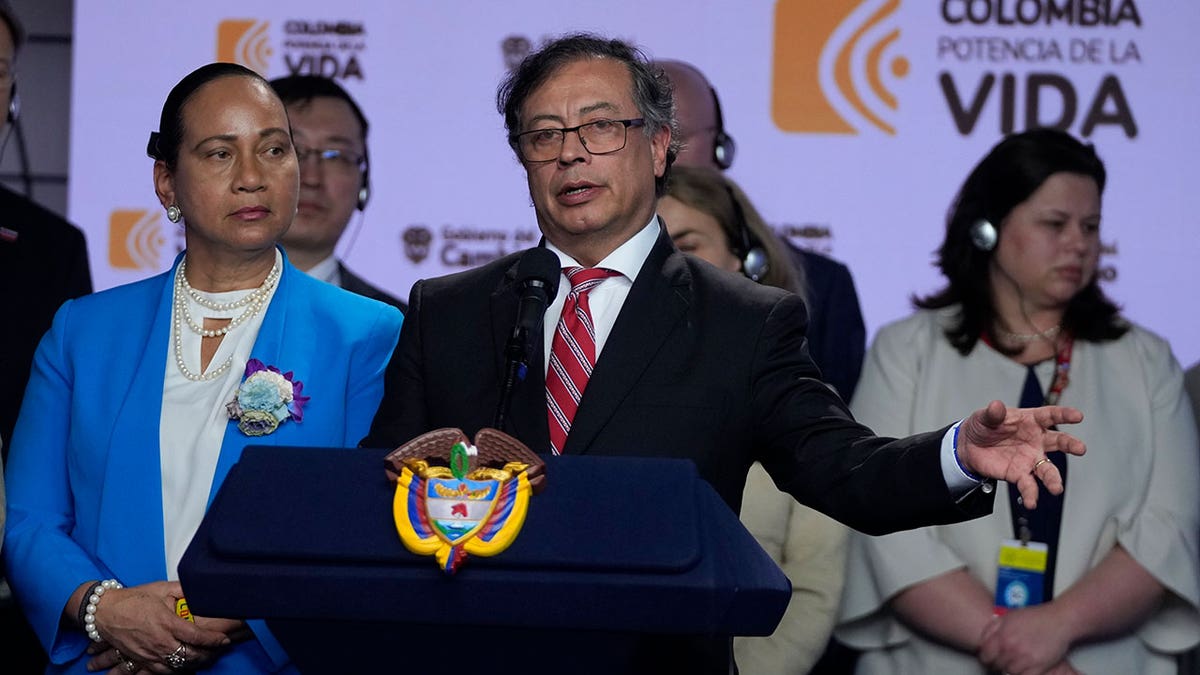
Colombia’s President Gustavo Petro said he has hired an American attorney. (AP Photo/Fernando Vergara, File)
The department accused him of providing narco-terrorist organizations with benefits under the auspices of his «total peace» plan, among other policies, which officials said have led to record highs in coca cultivation and cocaine production.
The Treasury also alleged Petro has allied himself with Maduro, who is also under U.S. sanction, and the Cartel de Los Soles.
WITKOFF SCRAMBLES FOR PEACE DEAL WITH RUSSIA AS SANCTIONS LOOM TARGETING INDIA, CHINA
«Gustavo Petro’s erratic behavior has also driven Colombia further apart from its partners in additional ways,» officials wrote. «In 2024, he shared confidential information obtained via secure anti-money laundering communication channels, threatening the integrity of the international financial system and leading to the suspension of Colombia’s Financial Intelligence Unit from The Egmont Group.»
Petro’s son and political heir, Nicolás, was charged in 2023 with money laundering and illicit enrichment over allegations that he funneled money received from drug traffickers into his father’s «total peace» efforts and election campaign.
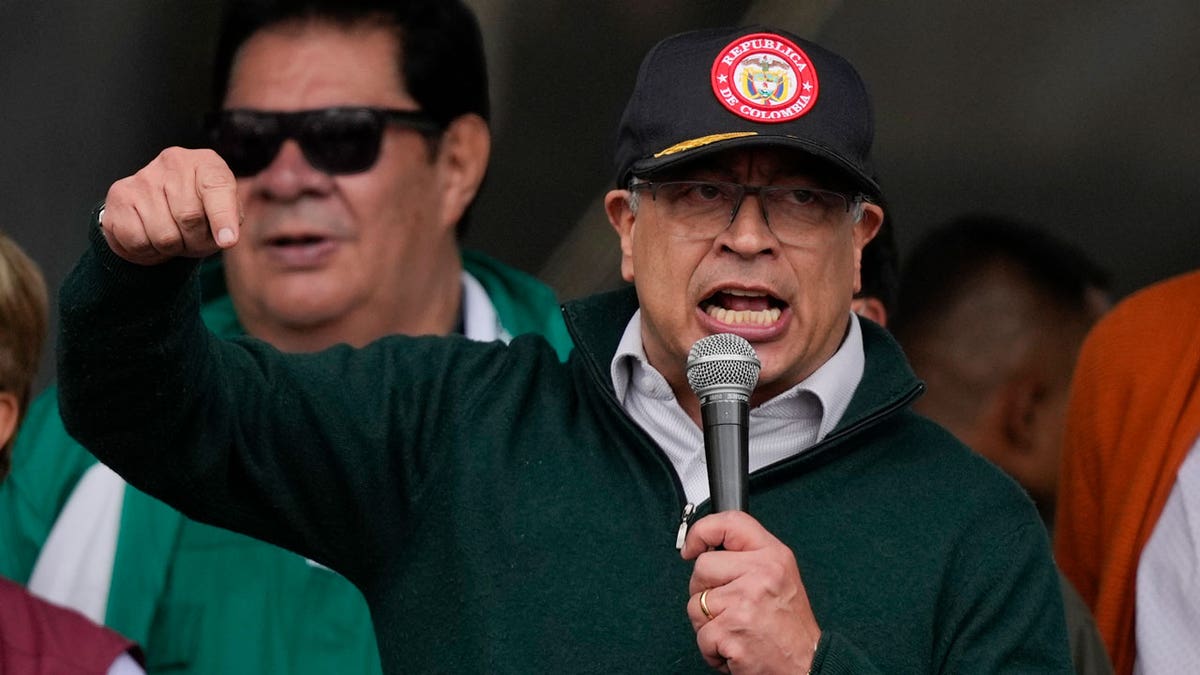
Colombian President Gustavo Petro was sanctioned along with his family and an associate. (AP Photo/Fernando Vergara)
He later admitted to receiving dirty money from a person formerly involved in narcotics trafficking and son of a contractor on trial for financing paramilitaries, according to officials.
President Donald Trump determined Columbia was a major drug transit or major illicit drug producing country on Sept. 15, finding it is «failing demonstrably» to uphold its drug control responsibilities.
TRUMP AND PUTIN’S RELATIONSHIP TURNS SOUR AS PRESIDENT PUSHES FOR RESOLUTION WITH UKRAINE
Property and assets belonging to those sanctioned, that are in the U.S. or controlled by people in the U.S., are frozen and must be reported to OFAC. Entities owned 50% or more by those sanctioned are also frozen, and U.S. citizens are generally prohibited from related transactions.
Violations can result in civil or criminal penalties, with OFAC able to impose civil penalties on a strict liability basis.
Principal deputy spokesperson Tommy Pigott added Secretary of State Marco Rubio will not certify Colombia under the criteria of the Department of State, Foreign Operations, and Related Programs Appropriations Act, 2024, as carried forward by the Full-Year Continuing Appropriations Act, 2025.
«The United States will not turn a blind eye to Petro’s appeasement and emboldening of narco-terrorists,» Pigott wrote in a statement. «We are committed to bringing terrorists and drug traffickers to justice and preventing deadly illegal drugs from entering our country. There must be no impunity for drug traffickers or acts of terrorism or violence by criminal armed groups.»
CLICK HERE TO DOWNLOAD THE FOX NEWS APP
«We remain steadfast in our support for Colombian security forces, its justice sector, and departmental and municipal officials, and we will continue to partner with them in our joint efforts to combat drug trafficking,» he added. «Today’s decision is not a reflection on these institutions but rather the failures and incompetence of Gustavo Petro and his inner circle.»
Sen. Bernie Moreno, R-Ohio, reacted to the announcement on X, saying «FAFO,» an acronym which stands for f— around and find out.
latin america,americas,south america,world

 CHIMENTOS3 días ago
CHIMENTOS3 días agoAdabel Guerrero confesó de qué famosa está enamorada y que le encantaría tener relaciones: «La China Suárez me sorprendió con su belleza»

 DEPORTE2 días ago
DEPORTE2 días agoUniversidad de Chile vs. Lanús, por la Copa Sudamericana: día, horario y cómo verlo por TV

 POLITICA2 días ago
POLITICA2 días agoDiego Luciani, sobre la condena a Cristina Kirchner: “No hay sentencia ejemplar sin recuperar lo robado”













